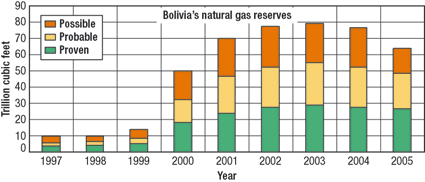International Politics
Bolivia’s gas sector nationalization. Almost two centuries after Bolivia proclaimed its independence from Spain, Bolivian President Evo Morales opened a newly elected Constituent Assembly, where the first task is to rewrite the country’s constitution. Morales’ focus is on empowering the majority indigenous population for the first time. Outside of Bolivia, particular focus will be on whether the assembly places any further controls on energy or other economic sectors, especially foreign investment. In the new assembly, elected on July 2, Morales’ party, MAS, (Movement Toward Socialism) has a thin majority. MAS does not have the two-thirds needed to control the assembly completely. A good portion of the opposition, particularly from the powerful department (equivalent to a US state) of Santa Cruz, will fight Morales on any move that discourages foreign investment. President Morales announced the nationalization of energy in May, causing great consternation in Washington and Brasilia. Morales nationalized the gas sector, because foreign companies control it almost entirely, both in terms of reserves ownership and production. Nationalization came exactly a year after the previous government passed a hydrocarbon law that levied an extra 32% tax on wellhead output, on top of the existing 18% royalty. The Hydrocarbons Law should not affect current gas output, but future expansion of the gas sector could be adversely impacted. Developments – like last year’s Hydrocarbons Law, this year’s gas nationalization and a recent action to put on hold a $2.3 billion contract with Jindal Steel & Power Ltd. to develop the Mutun iron ore mine – have spurred a decline in foreign investment in all Bolivian sectors, from $1 billion in 1999 to only $103 million now. After Venezuela, Bolivia has South America’s second-largest proved gas reserves at about 25.5 Tcf (see chart). Brazil’s Petrobras is Bolivia’s largest gas player, owning about 41% of reserves and producing about 75% of Bolivia’s 1.4 Bcfd. Spain’s Repsol-YPF produces almost the entire remainder. Consumption is only about 12% of output, so Bolivia has very good export potential. That potential, however, is jeopardized by tension between Morales and foreign operators.
Those favoring Morales’ actions argue that the move compels foreign firms to renegotiate contracts, so that they pay higher royalties. The firms most affected are Petrobras, the BG Group, Repsol-YPF and Total. The government also ordered Rio de Janeiro-based EBX Group to leave the country in April, on allegations that it violated environmental rules. In contrast, US companies are far less affected. For example, ExxonMobil has only a minority stake in a Total-run, non-producing gas field. Morales’ actions have had little effect on global gas prices, since most of its gas exports go to Argentina and Brazil. Nonetheless, they did heighten concerns that other Latin American producers, as well as other producing countries, would take advantage of high energy prices to make more demands of foreign countries and companies. In Bolivia, while oil companies are not being expropriated, the fear is that they will be removed as owners and retain duties only as gas field operators. The concern is that YBPF will be made sole owner. Bolivian Vice President Alvaro Garcia announced recently that under the decree, the government’s revenue share from gas production should rise from $460 million last year to $780 million by 2007. This announcement is a warning that the government will push the Hydrocarbons Law’s increase on royalties. Already, the two largest gas fields, San Alberto and San Antonio, are required to deliver more than 80% of production revenues to the state, rather than the present 50% rate. According to YPFB President Jorge Alvarado, “foreign firms will “still be making a profit of 20 to 25%.” Brazil and Argentina’s energy sectors are the most affected by Morales’ actions. Brazil, the largest investor in Bolivian energy at $1 billion, is most affected via Petrobras’ large ownership and production levels. Brasilia politicians are careful to not exacerbate tension between the two countries – Brazil does depend on Bolivia for domestic gas consumption. Two-thirds of Bolivian gas is exported to Brazil. However, Brazil has also made important gas finds on its own soil; Bolivia may not be able to influence Brazil for much longer, and may even lose a key gas export market. Yet, Brazil does not expect to extract its gas until 2009. Morales’ opposition hopes that he will be left-leaning like Brazilian President Luis Ignácio da Silva, but thus far he is in Venezuelan President Hugo Chávez’s mold. Argentina is also watching Morales closely, since it does import Bolivian gas. Bolivia’s conservative opposition is fighting Morales, to keep good relations with Argentina, which is a very good export market for Bolivian agricultural products. Argentine President Néstor Kirchner and Brazil’s da Silva have met with Morales to negotiate stable energy policies and prices. Policies and politics are also of concern to the US, primarily since Washington would like to influence Bolivia to produce less coca. Washington spends about $100 million annually on aid to Bolivia, much of which is in alternative development assistance to aid farmers to transition from coca production to other agricultural products or services. However, Morales is taking Chávez’s lead on trying to lessen US influence in all of Latin
|
|||||||||||





